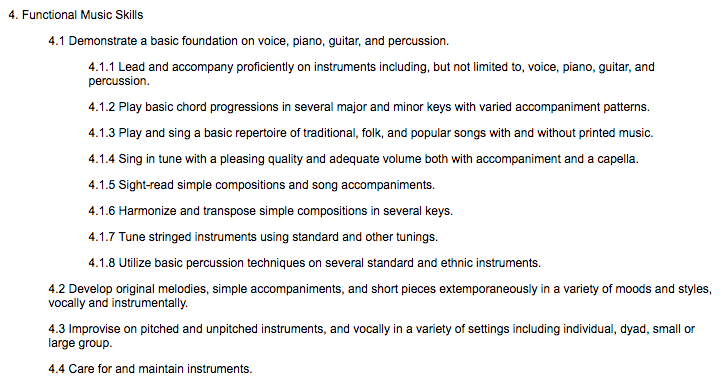What does it mean to be a functional musician?
Music therapy students come from a ton of musical backgrounds. I’ve had students that are classically trained pianists, but have never played in an ensemble with other musicians. Some students are self-taught and never had a lesson, but have gigged and gone on tour around the world. Others are singers who have a background in musical theater with a great ear, but still have to work on the basics of music theory. As a music therapy professor, it’s my job to get them all to a basic level of musical skills that a working music therapist relies on everyday, something called “functional musicianship.”
The American Music Therapy Association outlines the functional music skills that board-certified music therapists should have in the Professional Competencies document on their website. To be honest, it’s pretty vanilla and vague:

When I was overhauling my program’s music therapy proficiencies, I used the above guidelines to outline what we would require students to be able to do by the time they went into their music therapy internship. Still, I’m finding that it’s not enough. There are other skills not covered in the proficiencies that I’m finding students need when working in the clinic. Some of these skills I call “micro-skills” that they need to do before even starting to attempt the music therapy proficiencies.
Micro-skills like:
- Being able to hear a chord progression for a song and being able to start the melody in the right key
- Knowing a guitar strum so automatically that they can talk about something completely random while performing the strum
Then, there are what I call “extended skills” that seem to go beyond the AMTA’s definition of functional musicianship. Things I’ve needed to learn to be an effective music therapist, but were never formally taught to me in either of my music therapy degrees.
Extended skills like:
- Being able to correctly name and knowing the country of origin for a variety of percussion instruments
- Being able to perform a short freestyle rap
- Being able to play a guitar while walking
So, me being me, I made my own list of “functional skills” as a supplement to the AMTA functional music skills competencies. The plan is to work in opportunities for my students to practice these skills into my teaching so that my students are better prepared for their practicum placements and internship. And to be transparent, I’m still working on some of these functional skills myself like being able to beatbox and knowing basic music therapy phrases in Spanish. Acquiring the skills necessary to be a competent music therapist is not easy, but it’s important to be prepared for a wider variety of clinical situations and serving clients.
Check out my list of “Functional Skills Drills” here. I hope that these can serve as an audit of sorts for both music therapy students and board-certified music therapists. I expect the list to continue growing with others’ feedback so feel free to comment or tweet me at @BreaMTBC if you have other Functional Skills Drills suggestions!